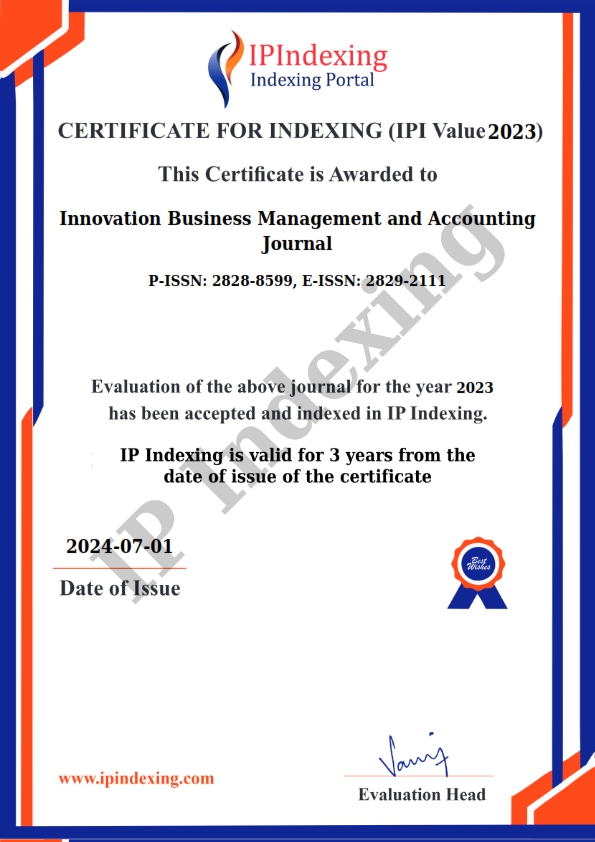The Impact of Green Economy Implementation on MSMEs in Musi Rawas District and its Implications on Business Growth
DOI:
https://doi.org/10.56070/ibmaj.2025.026Keywords:
Business Growth, Green Economy, Musi RawasAbstract
This study aims to analyze the impact of implementing green economy principles on micro, small, and medium enterprises (MSMEs) in Musi Rawas Regency and examine its implications for business growth. Green economy emphasizes resource efficiency, waste reduction, and environmental sustainability without ignoring economic growth. The method used in this study is a qualitative-descriptive approach with data collection through interviews, observations, and documentation studies of several MSME actors who have implemented environmentally friendly practices. The results of the study indicate that some MSMEs that adopt green economy principles, such as the use of environmentally friendly raw materials and good waste management, experience an increase in business image, customer loyalty, and cost efficiency in the long term. However, limited access to information, technology, and financing are major challenges in implementing a green economy widely. The implications of these findings indicate that with the support of appropriate policies and ongoing training, the green economy can be a significant driver of MSME business growth in the region. Therefore, synergy between the government, business actors, and financial institutions is needed to strengthen the green MSME ecosystem in Musi Rawas Regency.
Downloads
References
Anatan, L., & Nur. (2023). Micro, small, and medium enterprises’ readiness for digital transformation in Indonesia. Economies, 11(6), 156. https://doi.org/10.3390/economies11060156
Assor, A. R., & Rusdianti, I. S. (2023). How the accounting implementation in “Abon Ikan Tuna Lely Bintang” Ternate City? Innovation Business Management and Accounting Journal, 2(2), 63–70. https://doi.org/10.56070/ibmaj.v2i2.36
Darmawan, A. J., Nugraha Susilo, R. F., & Putri, Y. H. (2023). Konsep ekonomi sirkular dalam model bisnis berkelanjutan untuk membangun gaya hidup hijau masyarakat Indonesia. Jurnal Imagine, 3(1), 41–49. https://doi.org/10.35886/imagine.v3i1.520
Faizi, F., Wulandana, N. P., Alya, A., & Lombu, A. A. (2022). Dampak pandemi Covid-19 terhadap UMKM di Indonesia. Jurnal Lentera Bisnis, 11(2), 137–147. https://doi.org/10.34127/jrlab.v11i2.510
Fauzi, A., Hayyi’, M., & Alkhan, L. (2025). Ekonomi hijau dalam perspektif Islam: Studi kasus Timur Tengah. Jurnal Ekonomi Syariah dan Bisnis, 8(1), Artikel e13151. https://doi.org/10.31949/maro.v8i1.13151
Hayati, N., & Yulianto, E. (2020). Peranan keuangan berkelanjutan pada industri perbankan dalam mendukung sustainable development goals. Jurnal Akuntansi Bisnis dan Ekonomi, 6(1), 1–10.
Hegab, H., Shaban, I., Jamil, M., & Khanna, N. (2023). Toward sustainable future: Strategies, indicators, and challenges for implementing sustainable production systems. Sustainable Materials and Technologies, 36, e00617. https://doi.org/10.1016/j.susmat.2023.e00617
Herissuparman, E., Ismane, M. A., & Ashari, H. (2024). MSMEs and rural prosperity: A study of their influence in Indonesian agriculture and rural economy. International Journal of Innovative Science and Research Technology, 9(6), 2020–2025. https://doi.org/10.38124/ijisrt/ijisrt24jun1227
Malta, Y. A., & Rusdianti, I. S. (2023). Analysis of SAKTI implementation on the quality of management of fixed assets in the Religious High Court of Jayapura. Innovation Business Management and Accounting Journal, 2(2), 55–62. https://doi.org/10.56070/ibmaj.v2i2.42
Maulana, M., Saputra, N. D., Nugraha, M., & Intan, L. N. (2022). Model pengembangan ekonomi kreatif UMKM di Kabupaten Musi Rawas melalui pendidikan karakter, knowledge management, dan inovasi. Sebatik, 26(2), 609–615. https://doi.org/10.46984/sebatik.v26i2.2155
Muarif, I. (2025). Implementasi kebijakan ekonomi hijau pada pertumbuhan ekonomi dan kesejahteraan masyarakat. Jurnal Akuntansi, Keuangan, Perpajakan dan Tata Kelola Perusahaan, 2(3), 961–967. https://doi.org/10.70248/jakpt.v2i3.2085
Muttaqien, F., & Sulistyan, R. B. (2022). Product Branding Training Model for MSMEs in Probolinggo Regency. Innovation Business Management and Accounting Journal, 1(1), 26-31. https://doi.org/10.56070/ibmaj.v1i1.3
Permatasari, P., & Gunawan, J. (2023). Sustainability policies for small medium enterprises: Who are the actors? Cleaner and Responsible Consumption, 9, 100122. https://doi.org/10.1016/j.clrc.2023.100122
Phan, T. C. (2024). Impact of green investments, green economic growth and renewable energy consumption on environmental, social, and governance practices to achieve the sustainable development goals: A sectoral analysis in the ASEAN economies. International Journal of Engineering Business Management, 16, Artikel e1231725. https://doi.org/10.1177/18479790241231725
Raditya, M. R., & Azaria, D. P. (2024). Pemenuhan hak lingkungan bagi masyarakat tani yang terdampak perubahan iklim sesuai SDG di Indonesia. Jurnal Hukum dan Hak Asasi Manusia, 5(1), 786–799. https://doi.org/10.55637/juinhum.5.1.8234.786-799
Rahma, H., & Sanctyeka, T. (2024). Strategic variables of green economy transformation toward sustainable development in Indonesia. Proceedings of the International Conference on Green Economy (pp. 411–428). https://doi.org/10.1007/978-981-97-3320-0_30
Ramadani, S., Ramadhani, D. A., Ikrom, M., & Harahap, L. M. (2025). Peran strategis UMKM dalam mendorong pertumbuhan ekonomi berkelanjutan di Indonesia. Jurnal Ekonomi, Bisnis dan Manajemen, 4(1), 158–166. https://doi.org/10.58192/ebismen.v4i1.3183
Regif, S. Y., Seran, M. S., Naif, I. Y., Pattipeilohy, A., & Saputri, L. (2023). Literasi digital ekonomi hijau terhadap pemberdayaan UMKM desa di Kabupaten Langkat. Jurnal Ilmu Politik dan Pemerintahan, 9(1), Artikel e6922. https://doi.org/10.37058/jipp.v9i1.6922
Rogers, E. M., Singhal, A., & Quinlan, M. M. (2019). Diffusion of innovations. Dalam D. K. Stacks & M. B. Salwen (Ed.), An integrated approach to communication theory and research (3rd ed., pp. 415–433). Taylor & Francis. https://doi.org/10.4324/9780203710753-35
Satpathy, A., Sanatan, S., Sahoo, S. K., Mohanty, A., & Mohanty, P. P. (2025). Strategies for enhancements of MSME resilience and sustainability in the post-COVID-19 era. Social Sciences & Humanities Open, 11, 101223. https://doi.org/10.1016/j.ssaho.2024.101223
Sulistyan, R. B., Carito, D. W., Cahyaningati, R., Taufik, M., Kasno, K., & Samsuranto, S. (2022). Identification of Human Resources in the Application of SME Technology. Wiga : Jurnal Penelitian Ilmu Ekonomi, 12(1), 70-76. https://doi.org/10.30741/wiga.v12i1.799
Talim, B. (2024). Humane entrepreneurship implementation in Indonesian SMEs: Case study in West Java, Indonesia. Journal of the International Council for Small Business, 5(1), 17–24. https://doi.org/10.1080/26437015.2023.2261237
Tjahjadi, B., Soewarno, N., & Mustikaningtiyas, F. (2021). Good corporate governance and corporate sustainability performance in Indonesia: A triple bottom line approach. Heliyon, 7(3), e06453. https://doi.org/10.1016/j.heliyon.2021.e06453
Yatminiwati, M., Setyobakti, M. H., Sulistyan, R. B., & Ermawati, E. (2021). Social Entrepreneurship in MSME Development. International Journal of Environmental, Sustainability, and Social Sciences, 2(3), 239-243. https://doi.org/10.38142/ijesss.v2i3.111
Downloads
Published
How to Cite
Issue
Section
License
Copyright (c) 2025 Nopa Dwi Saputra, Qautsu Quza Fitria Jannah, Fhemmy Lia Purnama Dewi, Siti Nur Khotimah, Bambang Irawan, Nadia Ulfa

This work is licensed under a Creative Commons Attribution-ShareAlike 4.0 International License.



